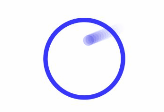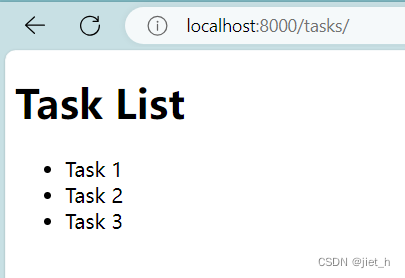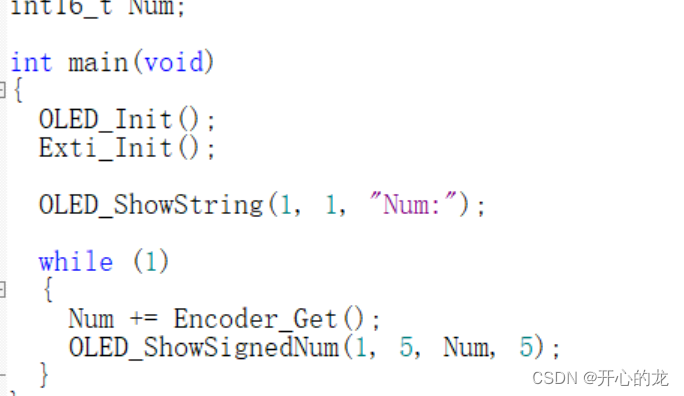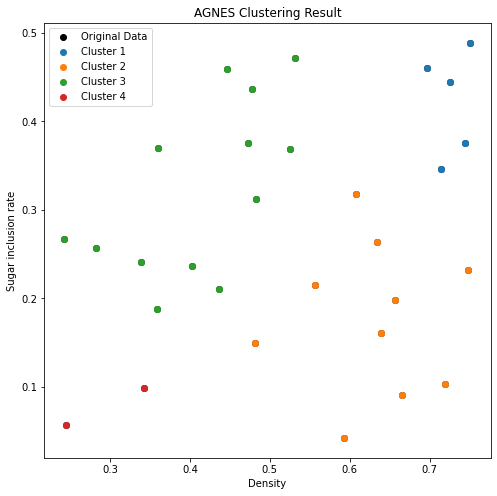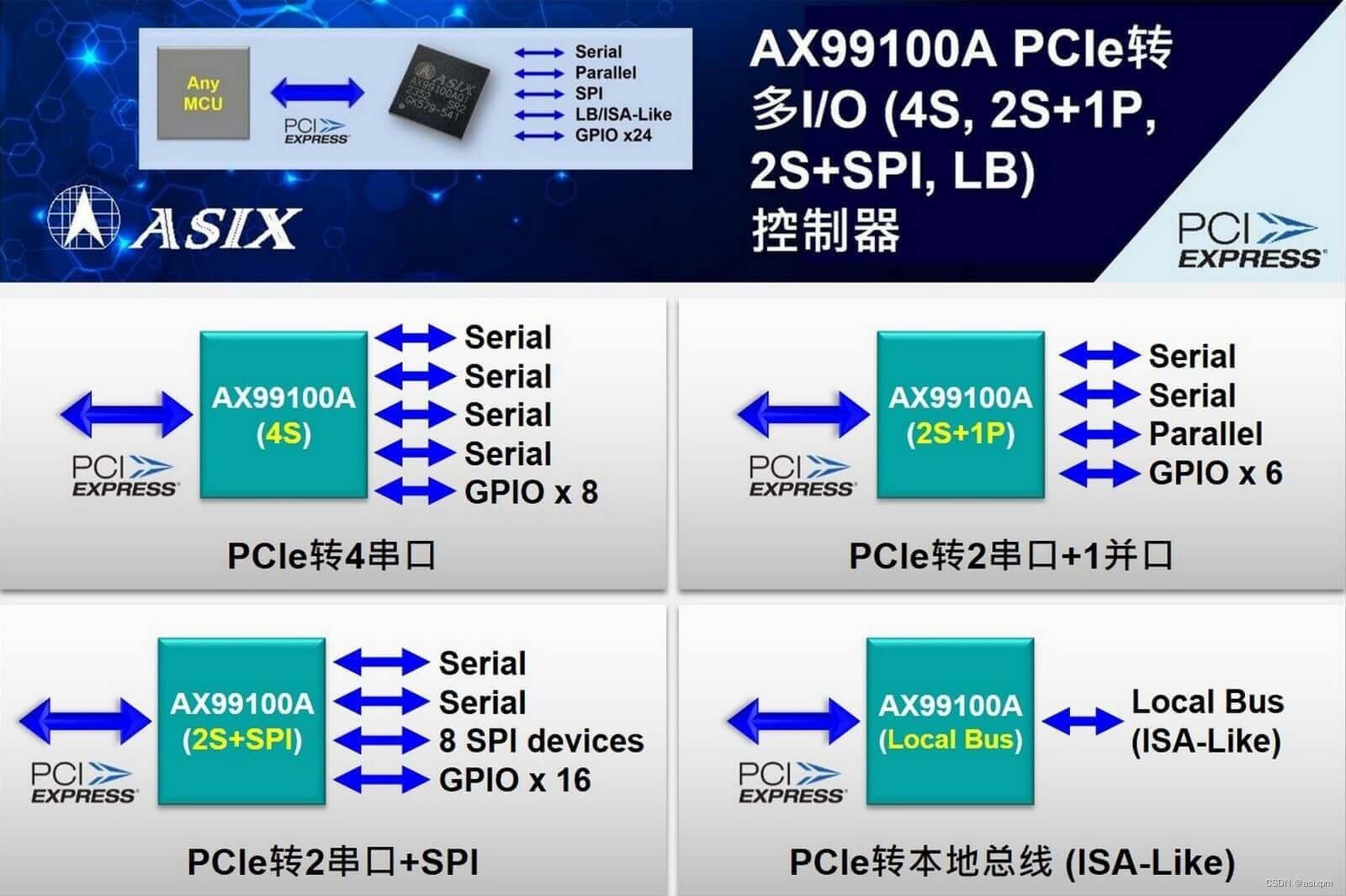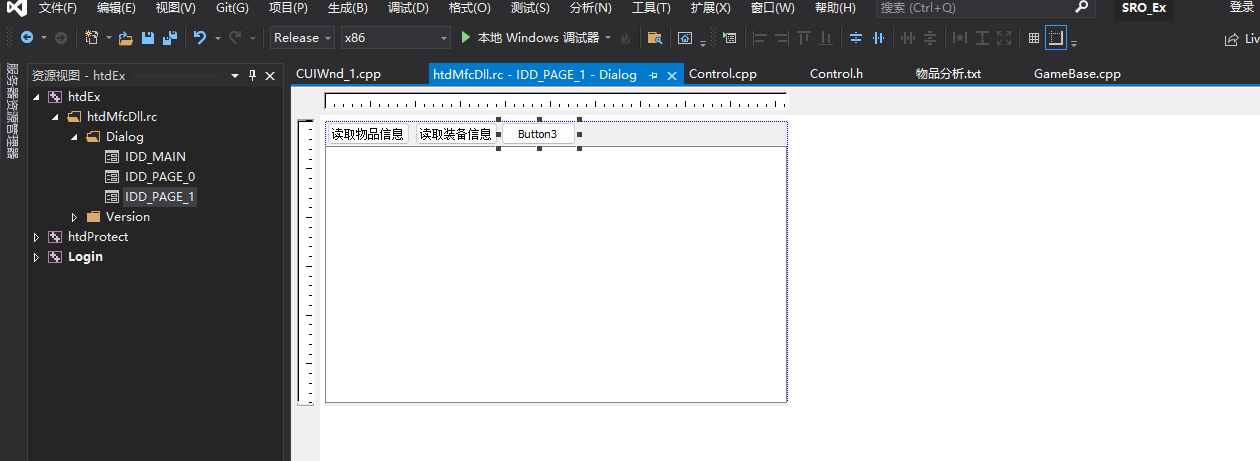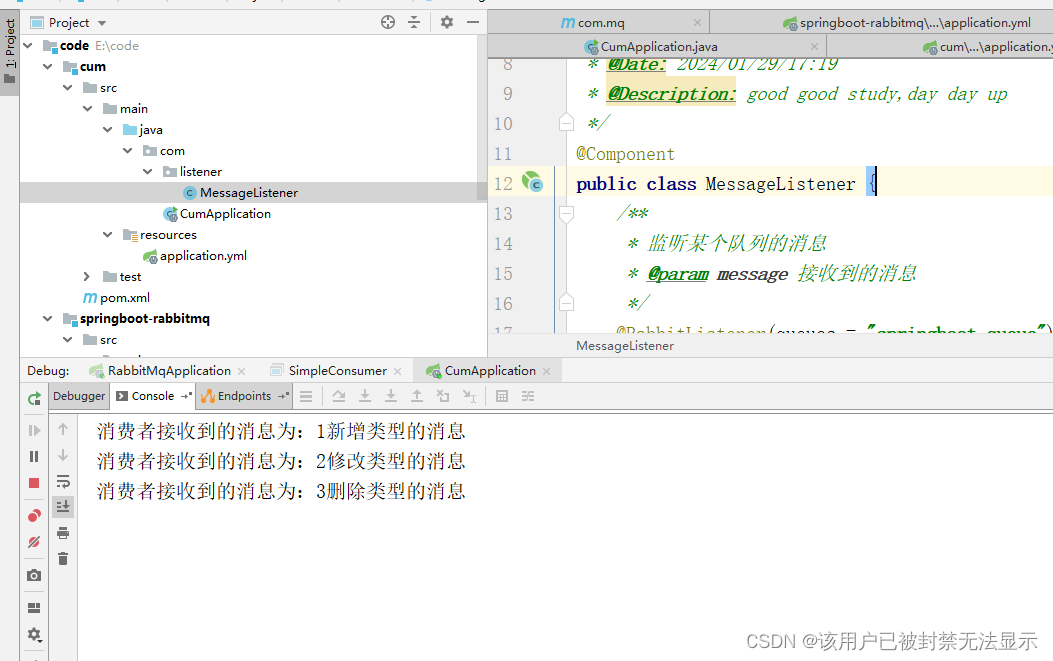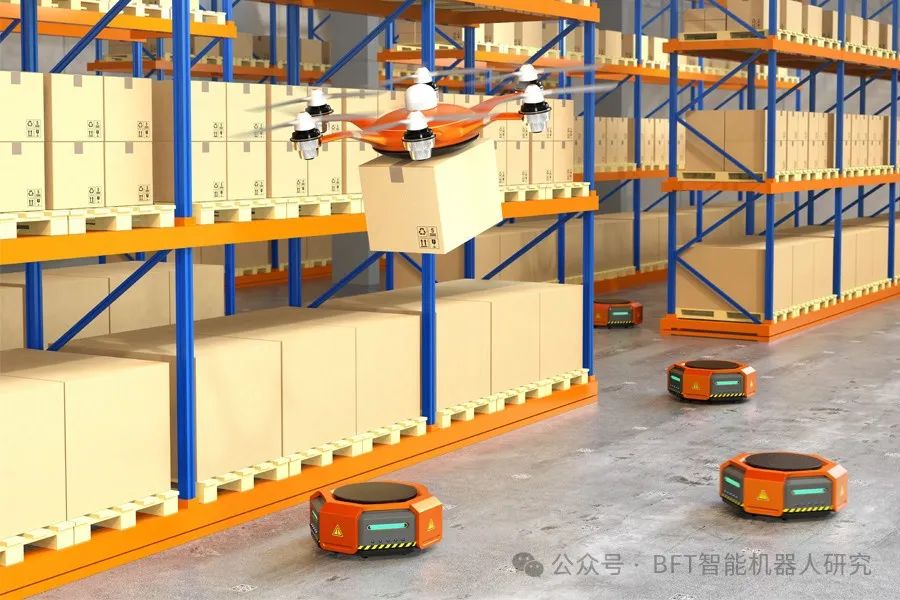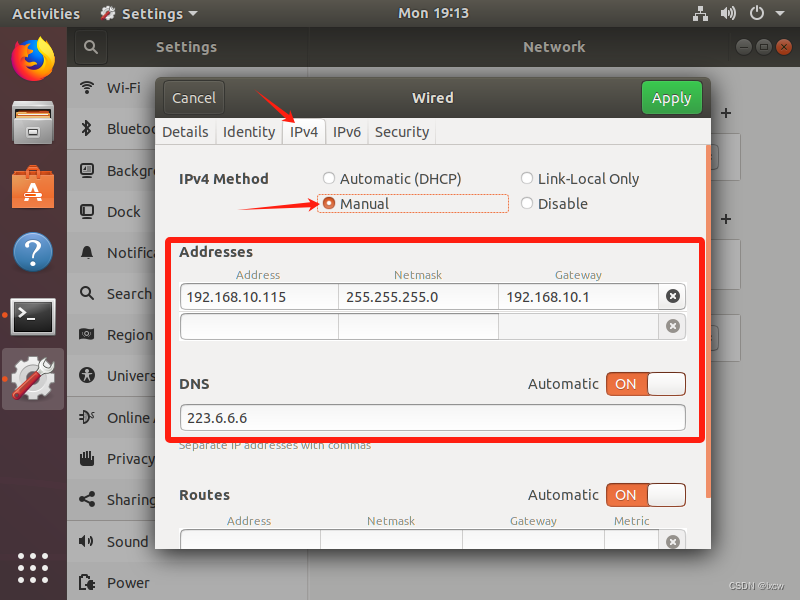ChannelHandle结构
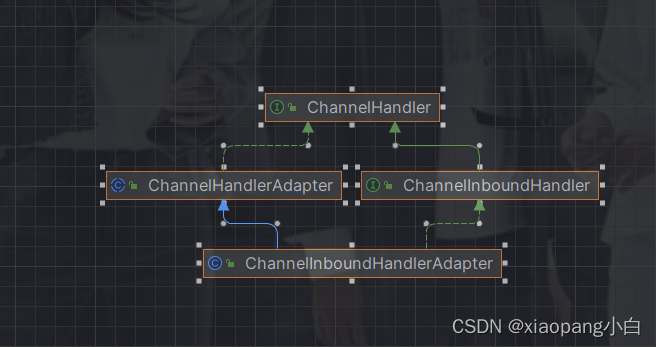
ChannelHandler基础接口
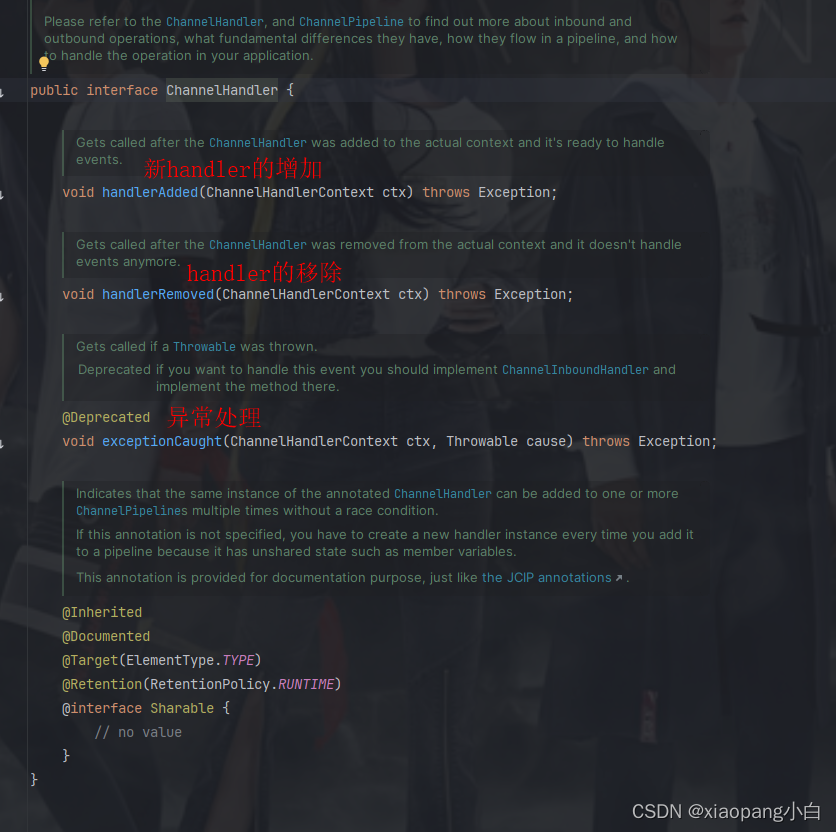
基础接口里面定义的基础通用方法。增加handler,移除handler,异常处理。
ChannelInboundHandler
public interface ChannelInboundHandler extends ChannelHandler {
/**
* The {@link Channel} of the {@link ChannelHandlerContext} was registered with its {@link EventLoop}
*/
void channelRegistered(ChannelHandlerContext ctx) throws Exception;
/**
* The {@link Channel} of the {@link ChannelHandlerContext} was unregistered from its {@link EventLoop}
*/
void channelUnregistered(ChannelHandlerContext ctx) throws Exception;
/**
* The {@link Channel} of the {@link ChannelHandlerContext} is now active
*/
void channelActive(ChannelHandlerContext ctx) throws Exception;
/**
* The {@link Channel} of the {@link ChannelHandlerContext} was registered is now inactive and reached its
* end of lifetime.
*/
void channelInactive(ChannelHandlerContext ctx) throws Exception;
/**
* Invoked when the current {@link Channel} has read a message from the peer.
*/
void channelRead(ChannelHandlerContext ctx, Object msg) throws Exception;
/**
* Invoked when the last message read by the current read operation has been consumed by
* {@link #channelRead(ChannelHandlerContext, Object)}. If {@link ChannelOption#AUTO_READ} is off, no further
* attempt to read an inbound data from the current {@link Channel} will be made until
* {@link ChannelHandlerContext#read()} is called.
*/
void channelReadComplete(ChannelHandlerContext ctx) throws Exception;
/**
* Gets called if an user event was triggered.
*/
void userEventTriggered(ChannelHandlerContext ctx, Object evt) throws Exception;
/**
* Gets called once the writable state of a {@link Channel} changed. You can check the state with
* {@link Channel#isWritable()}.
*/
void channelWritabilityChanged(ChannelHandlerContext ctx) throws Exception;
/**
* Gets called if a {@link Throwable} was thrown.
*/
@Override
@SuppressWarnings("deprecation")
void exceptionCaught(ChannelHandlerContext ctx, Throwable cause) throws Exception;
}
可以看到,channelInboundHandler集成channelhandler接口,新增方法:channelRegistered,channelUnregistered,channelActive,channelInactive,channelRead,channelReadComplete,userEventTriggered,channelWritabilityChanged。
ChannelHandlerAdapter
public abstract class ChannelHandlerAdapter implements ChannelHandler {
// Not using volatile because it's used only for a sanity check.
boolean added;
/**
* Throws {@link IllegalStateException} if {@link ChannelHandlerAdapter#isSharable()} returns {@code true}
*/
protected void ensureNotSharable() {
if (isSharable()) {
throw new IllegalStateException("ChannelHandler " + getClass().getName() + " is not allowed to be shared");
}
}
/**
* Return {@code true} if the implementation is {@link Sharable} and so can be added
* to different {@link ChannelPipeline}s.
*/
public boolean isSharable() {
/**
* Cache the result of {@link Sharable} annotation detection to workaround a condition. We use a
* {@link ThreadLocal} and {@link WeakHashMap} to eliminate the volatile write/reads. Using different
* {@link WeakHashMap} instances per {@link Thread} is good enough for us and the number of
* {@link Thread}s are quite limited anyway.
*
* See <a href="https://github.com/netty/netty/issues/2289">#2289</a>.
*/
Class<?> clazz = getClass();
Map<Class<?>, Boolean> cache = InternalThreadLocalMap.get().handlerSharableCache();
Boolean sharable = cache.get(clazz);
if (sharable == null) {
sharable = clazz.isAnnotationPresent(Sharable.class);
cache.put(clazz, sharable);
}
return sharable;
}
/**
* Do nothing by default, sub-classes may override this method.
*/
@Override
public void handlerAdded(ChannelHandlerContext ctx) throws Exception {
// NOOP
}
/**
* Do nothing by default, sub-classes may override this method.
*/
@Override
public void handlerRemoved(ChannelHandlerContext ctx) throws Exception {
// NOOP
}
/**
* Calls {@link ChannelHandlerContext#fireExceptionCaught(Throwable)} to forward
* to the next {@link ChannelHandler} in the {@link ChannelPipeline}.
*
* Sub-classes may override this method to change behavior.
*
* @deprecated is part of {@link ChannelInboundHandler}
*/
@Skip
@Override
@Deprecated
public void exceptionCaught(ChannelHandlerContext ctx, Throwable cause) throws Exception {
ctx.fireExceptionCaught(cause);
}
}
ChannelHandlerAdapter 是一个抽象类,实现接口ChannelHandler。exceptionCaught方法被实现。
ChannelInboundHandlerAdapter
public class ChannelInboundHandlerAdapter extends ChannelHandlerAdapter implements ChannelInboundHandler {
/**
* Calls {@link ChannelHandlerContext#fireChannelRegistered()} to forward
* to the next {@link ChannelInboundHandler} in the {@link ChannelPipeline}.
*
* Sub-classes may override this method to change behavior.
*/
@Skip
@Override
public void channelRegistered(ChannelHandlerContext ctx) throws Exception {
ctx.fireChannelRegistered();
}
/**
* Calls {@link ChannelHandlerContext#fireChannelUnregistered()} to forward
* to the next {@link ChannelInboundHandler} in the {@link ChannelPipeline}.
*
* Sub-classes may override this method to change behavior.
*/
@Skip
@Override
public void channelUnregistered(ChannelHandlerContext ctx) throws Exception {
ctx.fireChannelUnregistered();
}
/**
* Calls {@link ChannelHandlerContext#fireChannelActive()} to forward
* to the next {@link ChannelInboundHandler} in the {@link ChannelPipeline}.
*
* Sub-classes may override this method to change behavior.
*/
@Skip
@Override
public void channelActive(ChannelHandlerContext ctx) throws Exception {
ctx.fireChannelActive();
}
/**
* Calls {@link ChannelHandlerContext#fireChannelInactive()} to forward
* to the next {@link ChannelInboundHandler} in the {@link ChannelPipeline}.
*
* Sub-classes may override this method to change behavior.
*/
@Skip
@Override
public void channelInactive(ChannelHandlerContext ctx) throws Exception {
ctx.fireChannelInactive();
}
/**
* Calls {@link ChannelHandlerContext#fireChannelRead(Object)} to forward
* to the next {@link ChannelInboundHandler} in the {@link ChannelPipeline}.
*
* Sub-classes may override this method to change behavior.
*/
@Skip
@Override
public void channelRead(ChannelHandlerContext ctx, Object msg) throws Exception {
ctx.fireChannelRead(msg);
}
/**
* Calls {@link ChannelHandlerContext#fireChannelReadComplete()} to forward
* to the next {@link ChannelInboundHandler} in the {@link ChannelPipeline}.
*
* Sub-classes may override this method to change behavior.
*/
@Skip
@Override
public void channelReadComplete(ChannelHandlerContext ctx) throws Exception {
ctx.fireChannelReadComplete();
}
/**
* Calls {@link ChannelHandlerContext#fireUserEventTriggered(Object)} to forward
* to the next {@link ChannelInboundHandler} in the {@link ChannelPipeline}.
*
* Sub-classes may override this method to change behavior.
*/
@Skip
@Override
public void userEventTriggered(ChannelHandlerContext ctx, Object evt) throws Exception {
ctx.fireUserEventTriggered(evt);
}
/**
* Calls {@link ChannelHandlerContext#fireChannelWritabilityChanged()} to forward
* to the next {@link ChannelInboundHandler} in the {@link ChannelPipeline}.
*
* Sub-classes may override this method to change behavior.
*/
@Skip
@Override
public void channelWritabilityChanged(ChannelHandlerContext ctx) throws Exception {
ctx.fireChannelWritabilityChanged();
}
/**
* Calls {@link ChannelHandlerContext#fireExceptionCaught(Throwable)} to forward
* to the next {@link ChannelHandler} in the {@link ChannelPipeline}.
*
* Sub-classes may override this method to change behavior.
*/
@Skip
@Override
@SuppressWarnings("deprecation")
public void exceptionCaught(ChannelHandlerContext ctx, Throwable cause)
throws Exception {
ctx.fireExceptionCaught(cause);
}
}
ChannelInboundHandlerAdapter 是入站的一个落地实现。继承ChannelHandlerAdapter 实现接口ChannelInboundHandler 。默认反应方法实现调用ChannelHandlerContext中的事件发布。
ChannelHandlerContext
public interface ChannelHandlerContext extends AttributeMap, ChannelInboundInvoker, ChannelOutboundInvoker {
/**
* Return the {@link Channel} which is bound to the {@link ChannelHandlerContext}.
*/
Channel channel();
/**
* Returns the {@link EventExecutor} which is used to execute an arbitrary task.
*/
EventExecutor executor();
/**
* The unique name of the {@link ChannelHandlerContext}.The name was used when then {@link ChannelHandler}
* was added to the {@link ChannelPipeline}. This name can also be used to access the registered
* {@link ChannelHandler} from the {@link ChannelPipeline}.
*/
String name();
/**
* The {@link ChannelHandler} that is bound this {@link ChannelHandlerContext}.
*/
ChannelHandler handler();
/**
* Return {@code true} if the {@link ChannelHandler} which belongs to this context was removed
* from the {@link ChannelPipeline}. Note that this method is only meant to be called from with in the
* {@link EventLoop}.
*/
boolean isRemoved();
@Override
ChannelHandlerContext fireChannelRegistered();
@Override
ChannelHandlerContext fireChannelUnregistered();
@Override
ChannelHandlerContext fireChannelActive();
@Override
ChannelHandlerContext fireChannelInactive();
@Override
ChannelHandlerContext fireExceptionCaught(Throwable cause);
@Override
ChannelHandlerContext fireUserEventTriggered(Object evt);
@Override
ChannelHandlerContext fireChannelRead(Object msg);
@Override
ChannelHandlerContext fireChannelReadComplete();
@Override
ChannelHandlerContext fireChannelWritabilityChanged();
@Override
ChannelHandlerContext read();
@Override
ChannelHandlerContext flush();
/**
* Return the assigned {@link ChannelPipeline}
*/
ChannelPipeline pipeline();
/**
* Return the assigned {@link ByteBufAllocator} which will be used to allocate {@link ByteBuf}s.
*/
ByteBufAllocator alloc();
/**
* @deprecated Use {@link Channel#attr(AttributeKey)}
*/
@Deprecated
@Override
<T> Attribute<T> attr(AttributeKey<T> key);
/**
* @deprecated Use {@link Channel#hasAttr(AttributeKey)}
*/
@Deprecated
@Override
<T> boolean hasAttr(AttributeKey<T> key);
}
ChannelHandlerContext 继承ChannelInboundInvoker,ChannelOutboundInvoker。可以实现入站,出站事件的处理。
ChannelInboundInvoker
public interface ChannelInboundInvoker {
/**
* A {@link Channel} was registered to its {@link EventLoop}.
*
* This will result in having the {@link ChannelInboundHandler#channelRegistered(ChannelHandlerContext)} method
* called of the next {@link ChannelInboundHandler} contained in the {@link ChannelPipeline} of the
* {@link Channel}.
*/
ChannelInboundInvoker fireChannelRegistered();
/**
* A {@link Channel} was unregistered from its {@link EventLoop}.
*
* This will result in having the {@link ChannelInboundHandler#channelUnregistered(ChannelHandlerContext)} method
* called of the next {@link ChannelInboundHandler} contained in the {@link ChannelPipeline} of the
* {@link Channel}.
*/
ChannelInboundInvoker fireChannelUnregistered();
/**
* A {@link Channel} is active now, which means it is connected.
*
* This will result in having the {@link ChannelInboundHandler#channelActive(ChannelHandlerContext)} method
* called of the next {@link ChannelInboundHandler} contained in the {@link ChannelPipeline} of the
* {@link Channel}.
*/
ChannelInboundInvoker fireChannelActive();
/**
* A {@link Channel} is inactive now, which means it is closed.
*
* This will result in having the {@link ChannelInboundHandler#channelInactive(ChannelHandlerContext)} method
* called of the next {@link ChannelInboundHandler} contained in the {@link ChannelPipeline} of the
* {@link Channel}.
*/
ChannelInboundInvoker fireChannelInactive();
/**
* A {@link Channel} received an {@link Throwable} in one of its inbound operations.
*
* This will result in having the {@link ChannelInboundHandler#exceptionCaught(ChannelHandlerContext, Throwable)}
* method called of the next {@link ChannelInboundHandler} contained in the {@link ChannelPipeline} of the
* {@link Channel}.
*/
ChannelInboundInvoker fireExceptionCaught(Throwable cause);
/**
* A {@link Channel} received an user defined event.
*
* This will result in having the {@link ChannelInboundHandler#userEventTriggered(ChannelHandlerContext, Object)}
* method called of the next {@link ChannelInboundHandler} contained in the {@link ChannelPipeline} of the
* {@link Channel}.
*/
ChannelInboundInvoker fireUserEventTriggered(Object event);
/**
* A {@link Channel} received a message.
*
* This will result in having the {@link ChannelInboundHandler#channelRead(ChannelHandlerContext, Object)}
* method called of the next {@link ChannelInboundHandler} contained in the {@link ChannelPipeline} of the
* {@link Channel}.
*/
ChannelInboundInvoker fireChannelRead(Object msg);
/**
* Triggers an {@link ChannelInboundHandler#channelReadComplete(ChannelHandlerContext)}
* event to the next {@link ChannelInboundHandler} in the {@link ChannelPipeline}.
*/
ChannelInboundInvoker fireChannelReadComplete();
/**
* Triggers an {@link ChannelInboundHandler#channelWritabilityChanged(ChannelHandlerContext)}
* event to the next {@link ChannelInboundHandler} in the {@link ChannelPipeline}.
*/
ChannelInboundInvoker fireChannelWritabilityChanged();
}
入站事件触发
ChannelOutboundInvoker
public interface ChannelOutboundInvoker {
/**
* Request to bind to the given {@link SocketAddress} and notify the {@link ChannelFuture} once the operation
* completes, either because the operation was successful or because of an error.
* <p>
* This will result in having the
* {@link ChannelOutboundHandler#bind(ChannelHandlerContext, SocketAddress, ChannelPromise)} method
* called of the next {@link ChannelOutboundHandler} contained in the {@link ChannelPipeline} of the
* {@link Channel}.
*/
ChannelFuture bind(SocketAddress localAddress);
/**
* Request to connect to the given {@link SocketAddress} and notify the {@link ChannelFuture} once the operation
* completes, either because the operation was successful or because of an error.
* <p>
* If the connection fails because of a connection timeout, the {@link ChannelFuture} will get failed with
* a {@link ConnectTimeoutException}. If it fails because of connection refused a {@link ConnectException}
* will be used.
* <p>
* This will result in having the
* {@link ChannelOutboundHandler#connect(ChannelHandlerContext, SocketAddress, SocketAddress, ChannelPromise)}
* method called of the next {@link ChannelOutboundHandler} contained in the {@link ChannelPipeline} of the
* {@link Channel}.
*/
ChannelFuture connect(SocketAddress remoteAddress);
/**
* Request to connect to the given {@link SocketAddress} while bind to the localAddress and notify the
* {@link ChannelFuture} once the operation completes, either because the operation was successful or because of
* an error.
* <p>
* This will result in having the
* {@link ChannelOutboundHandler#connect(ChannelHandlerContext, SocketAddress, SocketAddress, ChannelPromise)}
* method called of the next {@link ChannelOutboundHandler} contained in the {@link ChannelPipeline} of the
* {@link Channel}.
*/
ChannelFuture connect(SocketAddress remoteAddress, SocketAddress localAddress);
/**
* Request to disconnect from the remote peer and notify the {@link ChannelFuture} once the operation completes,
* either because the operation was successful or because of an error.
* <p>
* This will result in having the
* {@link ChannelOutboundHandler#disconnect(ChannelHandlerContext, ChannelPromise)}
* method called of the next {@link ChannelOutboundHandler} contained in the {@link ChannelPipeline} of the
* {@link Channel}.
*/
ChannelFuture disconnect();
/**
* Request to close the {@link Channel} and notify the {@link ChannelFuture} once the operation completes,
* either because the operation was successful or because of
* an error.
*
* After it is closed it is not possible to reuse it again.
* <p>
* This will result in having the
* {@link ChannelOutboundHandler#close(ChannelHandlerContext, ChannelPromise)}
* method called of the next {@link ChannelOutboundHandler} contained in the {@link ChannelPipeline} of the
* {@link Channel}.
*/
ChannelFuture close();
/**
* Request to deregister from the previous assigned {@link EventExecutor} and notify the
* {@link ChannelFuture} once the operation completes, either because the operation was successful or because of
* an error.
* <p>
* This will result in having the
* {@link ChannelOutboundHandler#deregister(ChannelHandlerContext, ChannelPromise)}
* method called of the next {@link ChannelOutboundHandler} contained in the {@link ChannelPipeline} of the
* {@link Channel}.
*
*/
ChannelFuture deregister();
/**
* Request to bind to the given {@link SocketAddress} and notify the {@link ChannelFuture} once the operation
* completes, either because the operation was successful or because of an error.
*
* The given {@link ChannelPromise} will be notified.
* <p>
* This will result in having the
* {@link ChannelOutboundHandler#bind(ChannelHandlerContext, SocketAddress, ChannelPromise)} method
* called of the next {@link ChannelOutboundHandler} contained in the {@link ChannelPipeline} of the
* {@link Channel}.
*/
ChannelFuture bind(SocketAddress localAddress, ChannelPromise promise);
/**
* Request to connect to the given {@link SocketAddress} and notify the {@link ChannelFuture} once the operation
* completes, either because the operation was successful or because of an error.
*
* The given {@link ChannelFuture} will be notified.
*
* <p>
* If the connection fails because of a connection timeout, the {@link ChannelFuture} will get failed with
* a {@link ConnectTimeoutException}. If it fails because of connection refused a {@link ConnectException}
* will be used.
* <p>
* This will result in having the
* {@link ChannelOutboundHandler#connect(ChannelHandlerContext, SocketAddress, SocketAddress, ChannelPromise)}
* method called of the next {@link ChannelOutboundHandler} contained in the {@link ChannelPipeline} of the
* {@link Channel}.
*/
ChannelFuture connect(SocketAddress remoteAddress, ChannelPromise promise);
/**
* Request to connect to the given {@link SocketAddress} while bind to the localAddress and notify the
* {@link ChannelFuture} once the operation completes, either because the operation was successful or because of
* an error.
*
* The given {@link ChannelPromise} will be notified and also returned.
* <p>
* This will result in having the
* {@link ChannelOutboundHandler#connect(ChannelHandlerContext, SocketAddress, SocketAddress, ChannelPromise)}
* method called of the next {@link ChannelOutboundHandler} contained in the {@link ChannelPipeline} of the
* {@link Channel}.
*/
ChannelFuture connect(SocketAddress remoteAddress, SocketAddress localAddress, ChannelPromise promise);
/**
* Request to disconnect from the remote peer and notify the {@link ChannelFuture} once the operation completes,
* either because the operation was successful or because of an error.
*
* The given {@link ChannelPromise} will be notified.
* <p>
* This will result in having the
* {@link ChannelOutboundHandler#disconnect(ChannelHandlerContext, ChannelPromise)}
* method called of the next {@link ChannelOutboundHandler} contained in the {@link ChannelPipeline} of the
* {@link Channel}.
*/
ChannelFuture disconnect(ChannelPromise promise);
/**
* Request to close the {@link Channel} and notify the {@link ChannelFuture} once the operation completes,
* either because the operation was successful or because of
* an error.
*
* After it is closed it is not possible to reuse it again.
* The given {@link ChannelPromise} will be notified.
* <p>
* This will result in having the
* {@link ChannelOutboundHandler#close(ChannelHandlerContext, ChannelPromise)}
* method called of the next {@link ChannelOutboundHandler} contained in the {@link ChannelPipeline} of the
* {@link Channel}.
*/
ChannelFuture close(ChannelPromise promise);
/**
* Request to deregister from the previous assigned {@link EventExecutor} and notify the
* {@link ChannelFuture} once the operation completes, either because the operation was successful or because of
* an error.
*
* The given {@link ChannelPromise} will be notified.
* <p>
* This will result in having the
* {@link ChannelOutboundHandler#deregister(ChannelHandlerContext, ChannelPromise)}
* method called of the next {@link ChannelOutboundHandler} contained in the {@link ChannelPipeline} of the
* {@link Channel}.
*/
ChannelFuture deregister(ChannelPromise promise);
/**
* Request to Read data from the {@link Channel} into the first inbound buffer, triggers an
* {@link ChannelInboundHandler#channelRead(ChannelHandlerContext, Object)} event if data was
* read, and triggers a
* {@link ChannelInboundHandler#channelReadComplete(ChannelHandlerContext) channelReadComplete} event so the
* handler can decide to continue reading. If there's a pending read operation already, this method does nothing.
* <p>
* This will result in having the
* {@link ChannelOutboundHandler#read(ChannelHandlerContext)}
* method called of the next {@link ChannelOutboundHandler} contained in the {@link ChannelPipeline} of the
* {@link Channel}.
*/
ChannelOutboundInvoker read();
/**
* Request to write a message via this {@link ChannelHandlerContext} through the {@link ChannelPipeline}.
* This method will not request to actual flush, so be sure to call {@link #flush()}
* once you want to request to flush all pending data to the actual transport.
*/
ChannelFuture write(Object msg);
/**
* Request to write a message via this {@link ChannelHandlerContext} through the {@link ChannelPipeline}.
* This method will not request to actual flush, so be sure to call {@link #flush()}
* once you want to request to flush all pending data to the actual transport.
*/
ChannelFuture write(Object msg, ChannelPromise promise);
/**
* Request to flush all pending messages via this ChannelOutboundInvoker.
*/
ChannelOutboundInvoker flush();
/**
* Shortcut for call {@link #write(Object, ChannelPromise)} and {@link #flush()}.
*/
ChannelFuture writeAndFlush(Object msg, ChannelPromise promise);
/**
* Shortcut for call {@link #write(Object)} and {@link #flush()}.
*/
ChannelFuture writeAndFlush(Object msg);
/**
* Return a new {@link ChannelPromise}.
*/
ChannelPromise newPromise();
/**
* Return an new {@link ChannelProgressivePromise}
*/
ChannelProgressivePromise newProgressivePromise();
/**
* Create a new {@link ChannelFuture} which is marked as succeeded already. So {@link ChannelFuture#isSuccess()}
* will return {@code true}. All {@link FutureListener} added to it will be notified directly. Also
* every call of blocking methods will just return without blocking.
*/
ChannelFuture newSucceededFuture();
/**
* Create a new {@link ChannelFuture} which is marked as failed already. So {@link ChannelFuture#isSuccess()}
* will return {@code false}. All {@link FutureListener} added to it will be notified directly. Also
* every call of blocking methods will just return without blocking.
*/
ChannelFuture newFailedFuture(Throwable cause);
/**
* Return a special ChannelPromise which can be reused for different operations.
* <p>
* It's only supported to use
* it for {@link ChannelOutboundInvoker#write(Object, ChannelPromise)}.
* </p>
* <p>
* Be aware that the returned {@link ChannelPromise} will not support most operations and should only be used
* if you want to save an object allocation for every write operation. You will not be able to detect if the
* operation was complete, only if it failed as the implementation will call
* {@link ChannelPipeline#fireExceptionCaught(Throwable)} in this case.
* </p>
* <strong>Be aware this is an expert feature and should be used with care!</strong>
*/
ChannelPromise voidPromise();
}
出站事件触发
AbstractChannelHandlerContext
AbstractChannelHandlerContext是一个抽象类,实现ChannelHandlerContext。
在这个抽象类里面,fire开头方法和invoke开头方法。
1. fire开头方法,实现也是调用invoke开头方法。只不过入参的channelHandlerContext通过方法findContextInbound查询下一个入站或者出站的方法。例如FireChannelRead方法:
@Override
public ChannelHandlerContext fireChannelRead(final Object msg) {
invokeChannelRead(findContextInbound(MASK_CHANNEL_READ), msg);
return this;
}
private AbstractChannelHandlerContext findContextInbound(int mask) {
AbstractChannelHandlerContext ctx = this;
EventExecutor currentExecutor = executor();
do {
ctx = ctx.next;
} while (skipContext(ctx, currentExecutor, mask, MASK_ONLY_INBOUND));
return ctx;
}
2. invoke开头方法是静态方法,执行对应事件的方法。里面有个逻辑,获取当前context中的EventExecutor是不是NioEventLoop线程,是的话直接执行方法调用,不是的话,添加到NioEventLoop任务队列中。例如invokeChannelRead方法:
static void invokeChannelRead(final AbstractChannelHandlerContext next, Object msg) {
final Object m = next.pipeline.touch(ObjectUtil.checkNotNull(msg, "msg"), next);
EventExecutor executor = next.executor();
if (executor.inEventLoop()) {
next.invokeChannelRead(m);
} else {
executor.execute(new Runnable() {
@Override
public void run() {
next.invokeChannelRead(m);
}
});
}
}
ChannelPipeline
ChannelPipeline也实现了ChannelInboundInvoker,ChannelOutboundInvoker接口。具有入站出站事件执行的能力。ChannelHandlerContext也实现同样的接口。他们的区别是。ChannelHandlerContext方法执行是file开头对应的方法。ChannelPipeline方法执行调用的是ChannelHandlerContext中的invoke方法,入站是方法传入ChannelPipeline的head节点,出站方法传入ChannelPipeline的tail节点。
以下是ChannelPipeline的默认实现DefaultChannelPipeline,中fire方法实现。可以看到调用的就是ChannelHandlerContext中的静态invoke开头方法。
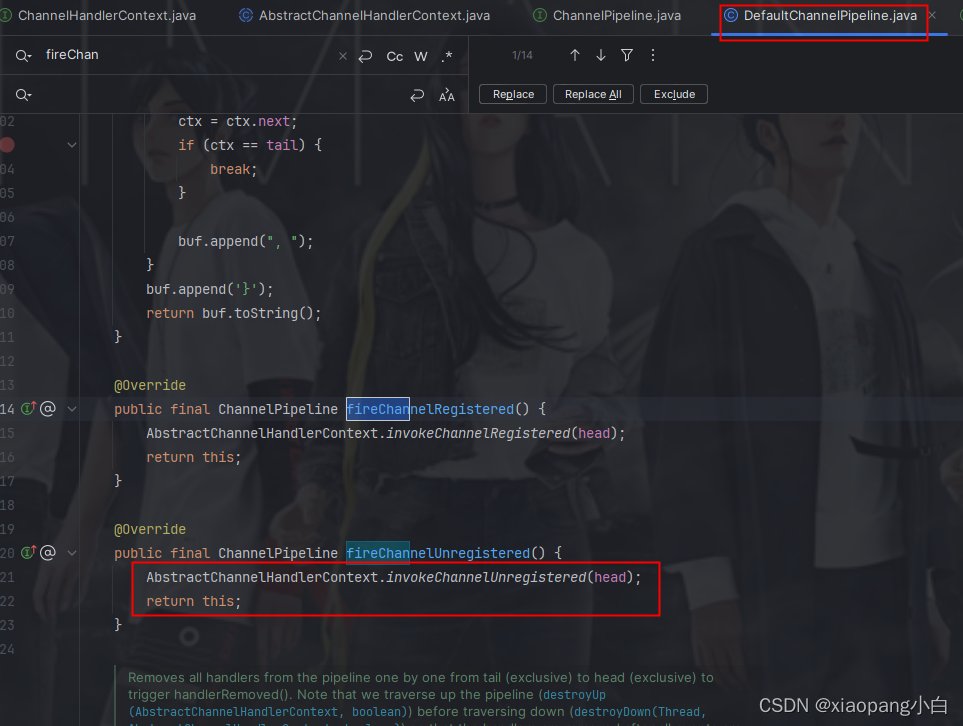
Inbound入站事件生命周期
在Netty中,ChannelHandler的生命周期与Channel的状态紧密相关,主要涉及到以下几个回调方法:
1. handlerAdded: 当一个新的ChannelHandler被添加到ChannelPipeline时调用。
2. channelRegistered: 当Channel成功注册到EventLoop上时调用。
3. channelActive: 当Channel激活,可以开始接收和发送数据时调用。
4. channelRead: 当从Channel中读取到数据时调用。
5. channelReadComplete: 当一次读取操作完成时调用。
6. channelInactive: 当Channel变为非激活状态时调用。
7. channelUnregistered: 当Channel从EventLoop上注销时调用。
8. handlerRemoved: 当ChannelHandler从ChannelPipeline中移除时调用
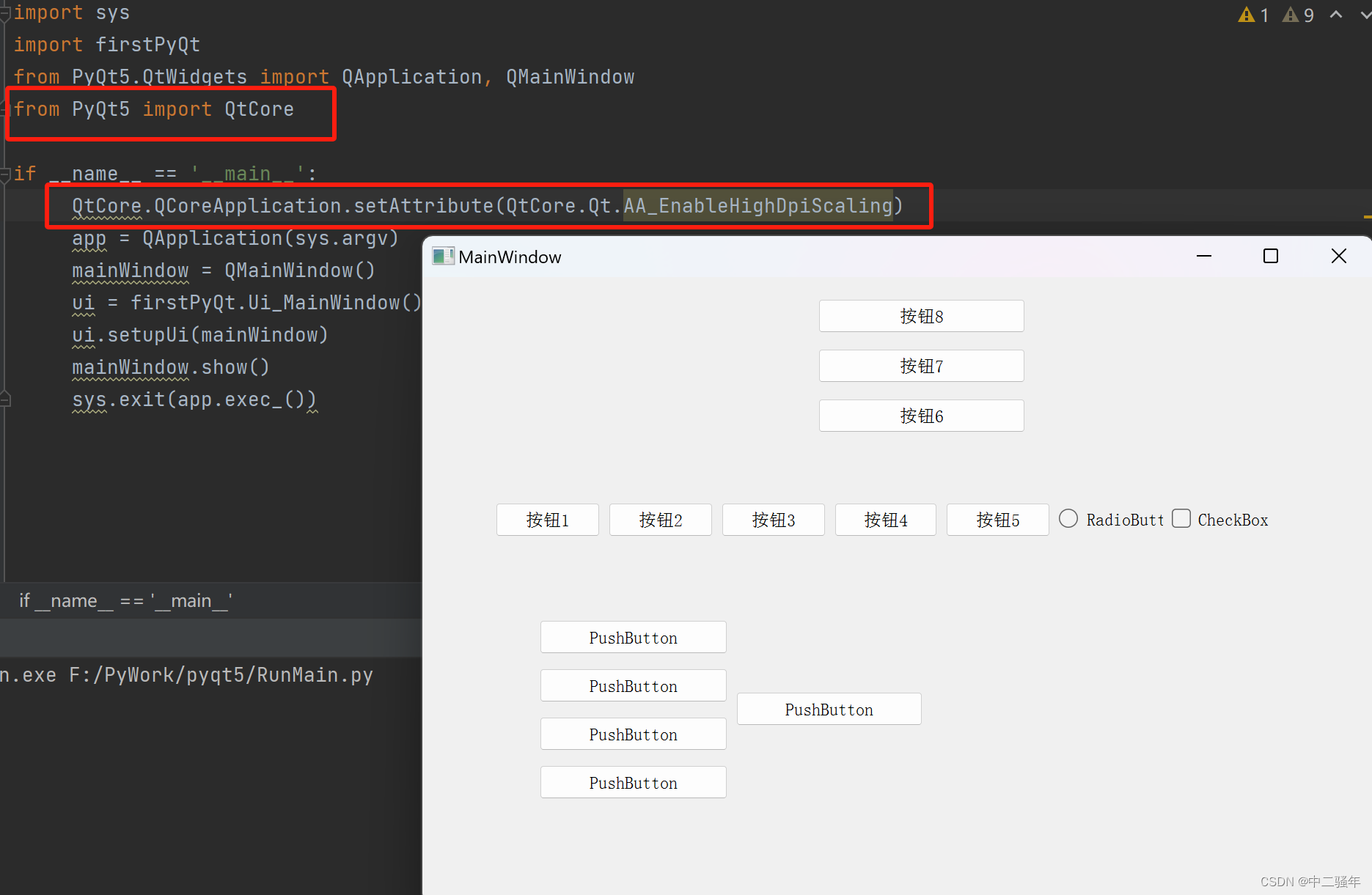
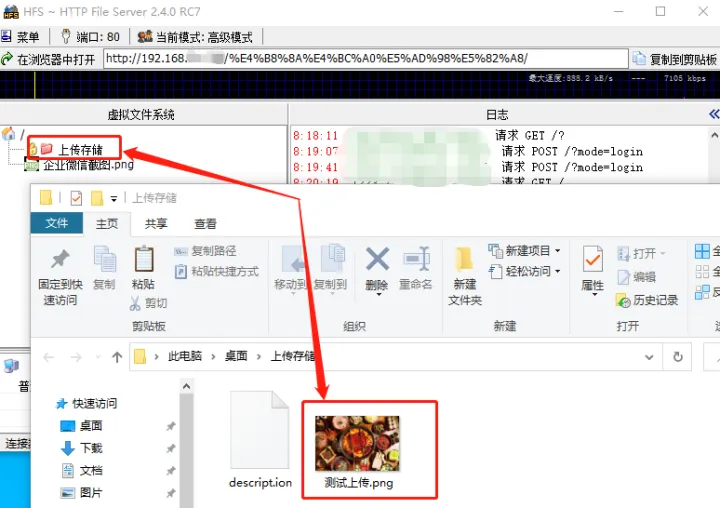

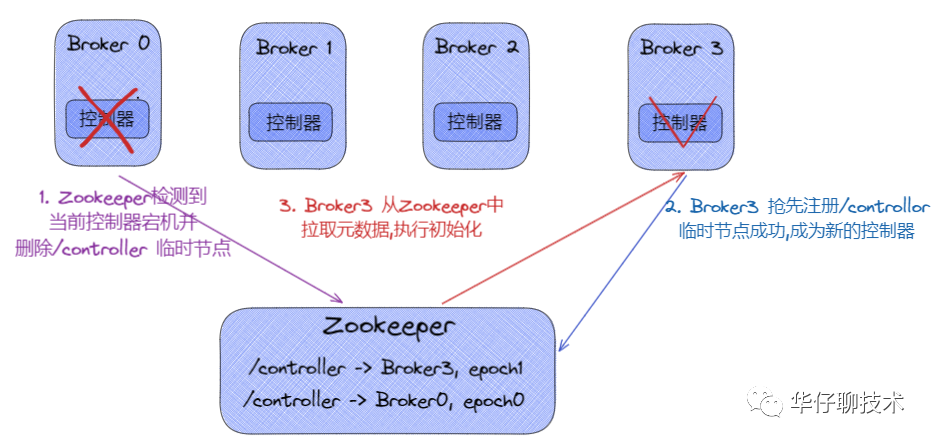
![[N-135]基于springboot,vue高校图书馆管理系统](https://img-blog.csdnimg.cn/direct/cd2a9e6af1f947f2945d49fd13b8ba41.png)
